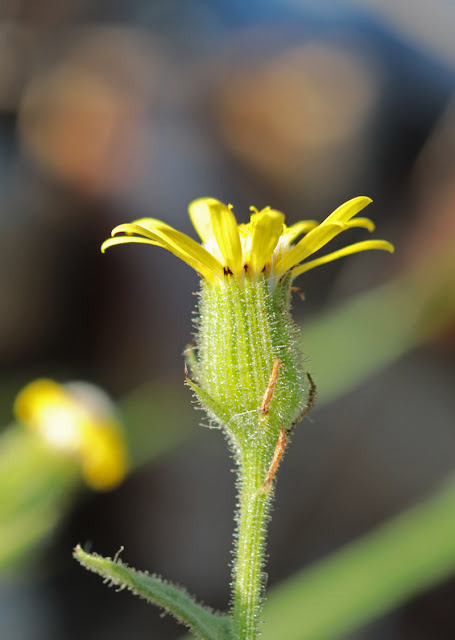Bedgebury Forest and Rye Harbour NR - 20/10/18
Bedgebury is home to half the species of confiers in the world, so they claim. It is clear that there is a tremendous variety of conifers here and with the autumnal colours just starting to show through, it was a good time to visit.
Of course, the majority of plants/trees here are planted specimens, though I was on the look out for anything natural I might find.
Apart from a solitary Agrimony in flower, I found a nice stand of Devil's Bit Scabious in flower but that was about it!
Succisa pratensis
However, there wasn't much in the way of anything wild to be found. So I made the most of the planted specimens here, much the same as watching animals in a zoo!
Callipcarpa japonica
Japanese Beautyberry Tree
Cotinus coggygria
Grey Smoke Bush
From here we made our way to the coast for a walk at Rye nature reserve. This coastal shingle and salt marsh reserve is always worth a look around whatever the time of year.
Echium vulgare
Viper's Bugloss flowering on the path from the car park along the River Rother to the sea.
Sea Spurge. There's plenty of it on the West bank of the Rother as you pass the old information hut.
Euphorbia paralias
Herb Robert is a very common plant, most often found in shady places such as woodland paths or in gardens or pavement cracks.
However, there is a prostrate variety usually found on sand or shingle on the coasts and here there is plenty of it.
Geranium robertianum subspecies maritimum
Pastinaca sativa
Wild Parsnip was in flower in several locations on our walk around the reserve. For identifying these yellow flowered umbellifers, have a quick look at the leaves. Below are those of Wild Parsnip, but if the leaves are fine and feathery, they will likely be Wild Fennel, the only other yellow late flowering large umbellifer plant likely to be found.
The beautiful lemon coloured flowers of Mouse-ear Hawkweed
Pilosella officinarum
Sticky Groundsel is another shingle coastal speciality.
Note the very obvious glandular tipped hairs. Touch them and you get a sickly lemon smell on your fingers.
Senecio viscosus
A few Sea Campions were flowering, with the majority now in seed. These will always only have one flower per stem, unlike the superficially similar Bladder Campion which may have several.
Silene uniflora
At this time of the year, it's not always about the flowers. The fruits of Bittersweet are now very obvious dotted along the shingle pathways.
This plant is a relative of the tomato and the potato, but don't eat these as you will get an upset stomach if you do!
Solanum dulcamara
There were several of these attractive Mulleins around, much smaller in stature than the usual Great Mullein.
You need a good close up photograph of the stamens and anthers to identify them. This one had a combination of purple and white hairs narrowing down the possibilities.
Leaves are obviously useful as well.
This turned out to be Twiggy Mullein though it is very similar to Moth Mullein as well
Verbascum virgatum
In the relatively newly created saltmarsh habitats were thousands of Sea Spurries in flower, both Greater (as shown) and Lesser.
An easy ID tip to separate them is that Greater always has 10 stamens, Lesser has, well - less!
Spergularia media
Some more fine views from our walk around the reserve. In the photo above at my feet (but not shown) was a good sized colony of the rare Sea Pea, though not in flower now.
Below is a view back east to the red roofed hut on the banks of the River Rother and the wind farm many miles further away near Brookland in neighbouring Kent.
I hope you enjoyed the trip!
Take care
Dave
@Barbus59

































Comments
Post a Comment
Comments welcome from those interested in my articles. For spammers don't bother as I moderate all comments prior to posting them.